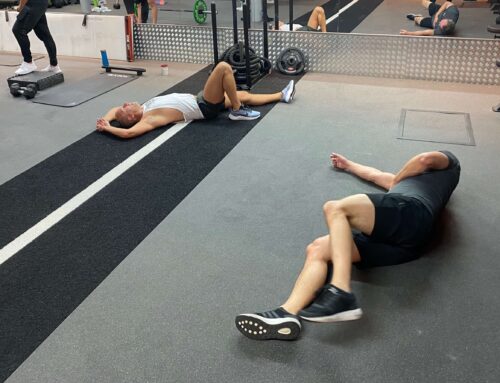You’ve just started exercising, you’re highly motivated and have a ‘LET’S DO THIS’ attitude. So you decide to go from not doing any exercise to training 5+ times per week. You hobble from one workout to the next thinking more is better until training begins to falter. Possibly because you keep getting sick or aren’t sleeping so well. Your appetite has changed, and one minor injury has suddenly turned into a series of niggling issues. You’re wondering what the problem could be, why you aren’t feeling that great currently. What you might not suspect is that you’re overtraining.
Overtraining is not just something that can happen to athletes. In fact it is probably more likely to happen to non-athletes that have no training or recovery plan. Recovery is often overlooked by non-athletes with additional training the preferred option. However, recovery is where the magic happens, it’s where we heal and bounce back stronger, fitter and faster.
So, here’s how to spot the signs of overtraining, recover from them and avoid them in the future
OVERTRAINING SYMPTOMS
Overtraining can appear in many ways. It could be easy to misinterpret the signs at first. After all, you may not guess that a weakened immune system is linked to your burnout from exercise, but it’s a very common indicator that you’re overdoing it. So, here is a range of symptoms to look out for if you suspect you may have been overtraining.
- Slower recovery in your heart rate after exercise: an early warning sign.
- Persistent colds, flu, or respiratory infections: a key symptom of overtraining.
- Persistent muscle soreness or pain from training: either during or after exercise.
- Lack of motivation/enthusiasm for exercise
- Decrease in performance
- Frequent injuries
- Insomnia or sleep disturbances
- Menstrual cycle disturbances
- Depression, stress, irritability, and restlessness
- Change in appetite
- Loss of body mass
HOW CAN I TELL IF I’M OVERTRAINING?
As you can see from the wide range of overtraining symptoms above, there are many ways that burnout can show up due to exercise. Understanding what overtraining can look and feel like for you is essential to your workout process.
Primarily, it’s about listening to your body and learning not to dismiss any warning signs. So, here are some ways to track and observe your physical responses.
RESTING HEART RATE
Your morning resting heart rate is one metric that can be used as an indicator of overtraining. Track your resting morning heart rate two or three days after a hard workout. If it’s significantly elevated from its usual average (seven or more beats per minute), that’s a sign that you’re not fully recovered from the workout.
HEART RATE VARIABILITY (HRV)
Heart rate variability is where the amount of time between your heartbeats fluctuates slightly. These variations are very small, adding or subtracting a fraction of a second between beats.
Your body has many systems and features that let it adapt to where you are and what you’re doing. Your heart’s variability reflects how adaptable your body can be. If your heart rate is highly variable, this is usually evidence that your body can adapt to many kinds of changes. A high variability score is a sign that you have recovered from training.
In general, low heart rate variability is considered a sign of current or future health problems because it shows your body is less resilient and struggles to handle changing situations. It’s also more common in people who have higher resting heart rates. That’s because when your heart is beating faster, there’s less time between beats, reducing the opportunity for variability. This is often the case with conditions like diabetes, high blood pressure, heart arrhythmia, asthma, anxiety and depression. A low variability score is a sign of over training
HOW TO RECOVER FROM OVERTRAINING
If you suspect you are beginning to burn out, you can easily take action to ensure you don’t start overtraining. However, if you can’t bounce back in a few days, you have probably been overtraining and need to focus on a longer-term recovery plan.
WHEN YOU’RE FEELING A LITTLE BURNT OUT
The best thing you can do when you begin to experience burnout is to focus on caring for yourself, nourishing your body to assist your recovery. Here are some great ways that you can quickly take care of yourself.
- Hydrate
- Eat plenty of green vegetables and protein
- Chill for a few days
- Book in for a massage
- Meditate and mindful breathing
- Return to exercise gently
- Focus on low intensity steady state exercise
HOW TO AVOID OVERTRAINING
Ramp up exercises gradually, using the classic progression rules. That means increasing no more than 5 to 10 percent every few weeks, be it an increase in intensity, distance, or weight load.
Also, remember that illness or injury is not a reason to ‘double down’ the following week. You don’t have to make up for lost time in your training. Accept it as rest and recovery and continue with your regular training schedule rather than pushing yourself harder.
Speaking of rest, ensure you regularly get 7-9 hours of uninterrupted sleep per night, especially on a training day. Plus, give yourself 48 hours to recover after intense workouts or activities. Not only will it help you avoid overtraining, but getting lots of sleep has the added bonus of helping you build muscle.
Think you might be overtraining? Need help with training and recovery, get in contact by completing the form below.
Book a free consultation
Leave your details and we’ll get in touch to arrange a consultation to discuss your goals.






